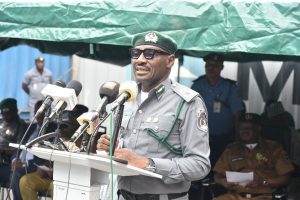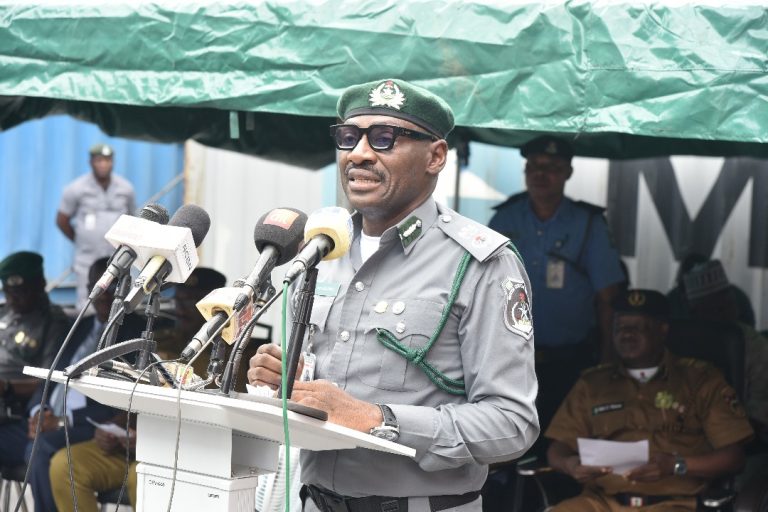…US and Nigeria see painful parallels in school safety debate***
Lionel Messi scored his 100th Champions League goal as Barcelona defeated Chelsea 3-0 on Wednesday to reach the quarter-finals of the tournament, 4-1 on aggregate.
Messi, back in the side after attending the birth of his third child in Argentina at the weekend, reached the landmark with his second goal of the night after 62 minutes at Camp Nou.
He had already put Barcelona ahead after just three minutes, beating Chelsea goalkeeper Thibaut Courtois at his near post with Ousmane Dembele adding the second on 20 minutes after being set up by Messi.
Barcelona join Real Madrid, Sevilla, Manchester City, Liverpool, Juventus, Roma and Bayern Munich in Friday’s quarter-final draw.
Meanwhile, Facing different but equally harrowing crises, parents and educators in the United States and northeast Nigeria are debating similarly drastic measures to improve school safety as a painful public reckoning plays out in both countries.
As students hold walkouts across the U.S. amid a scourge of mass shootings, President Donald Trump’s proposal to put more guns in schools carries echoes of questions being asked in one corner of Africa’s most populous country. Determined to do something, Nigeria’s government has deployed armed guards to schools while parents debate the merits of arming teachers themselves.
Americans tend to think of their struggles as far removed from the misfortunes that afflict distant, volatile nations like Nigeria, where 110 schoolgirls abducted in February from the town of Dapchi have not been returned. After all, while America has been devastated by terrorism, there is no marauding insurgency in the U.S. like the Boko Haram extremists who have killed more than 20,000 people in the last eight years.
For parents focused squarely on their children’s wellbeing, that distinction may be beside the point.
“What teachers should have in their hands should be chalk, books, rulers and markers — certainly not guns,” said Nafisat Aliyu, a mother of three boys in Maiduguri, Borno state, where Boko Haram was formed. She said impressionable young kids may see their teachers carrying firearms and decide they want to try one for themselves. “Armed teachers can be as dangerous as having some crazy fellow running into the school with a blazing gun.”
The threat to students at school in northeast Nigeria has had devastating consequences. Nearly 1,400 primary and junior secondary schools have been destroyed in Borno state by Boko Haram insurgents, according to UNICEF and Borno government statistics. A total of 2,295 teachers have been killed since 2009. Schools were closed for about 40 months in the region, and even today, 52 percent of children are not attending school.
In Parkland, Florida, 17 people were killed last month at Stoneman Douglas High School and its students have become prominent gun control advocates. They’ve been vocal in opposition to arming their teachers as a policy response. The students have used rallies and media appearances to call for stricter laws on guns, including a new Florida measure to raise the minimum age to buy rifles to 21 from 18.
On Wednesday, tens of thousands of young students held a walkout at schools across the United States, leaving class for 17 minutes in honor of the 17 killed in Parkland.
“We go to school to learn to get an education to prepare for the future, but with these school shootings happening, we are scared to come to school,” said Leila Montgomery, a 10th-grader at Atlanta’s Druid Hills High School, who called for society-wide measures like better background checks and an assault weapons ban. “We are afraid things will happen.”
The debate is also playing out in Washington as Trump, in his school safety proposal released this week, pledged to help states pay for firearms training for teachers. U.S. Education Secretary Betsy DeVos has also said that schools and communities that want to arm their teachers should have that option.
After the Parkland shooting, Trump said making schools totally gun-free was like “an invitation for these very sick people to go there.” He argued it made sense to arm “a small portion” of teachers who “are very gun-adept, that truly know how to handle it.”
“If that happens, you’re not going have any problems anymore, because they’re never going to the school,” Trump said.
Global approaches to school safety vary from place to place, though there don’t appear to be any countries that arm their teachers to the extent Trump has suggested.
Armed security officers are routine at Israeli schools, and Russia has put guards at schools following violent incidents that garnered national attention. In Mexico, many cities hold emergency drills for what to do if gunfire related to the drug war breaks out near schools, as sometimes happens. In Sweden, the education authority issues pamphlets with general advice about armed attacks.
In Nigeria’s Yobe state, where the girls were taken last month, the government has already made changes, deploying armed guards to schools in remote locations following an order by the interior minister.
Yet parents, teachers and education officials in Nigeria’s precarious northeast told The Associated Press they prefer alternate means of ensuring safety than teachers carrying guns in class. Mohammed Lamin, Yobe’s education commissioner, pointed out that teachers are not trained to carry firearms.
Guardian NG with additional report from ABC




















